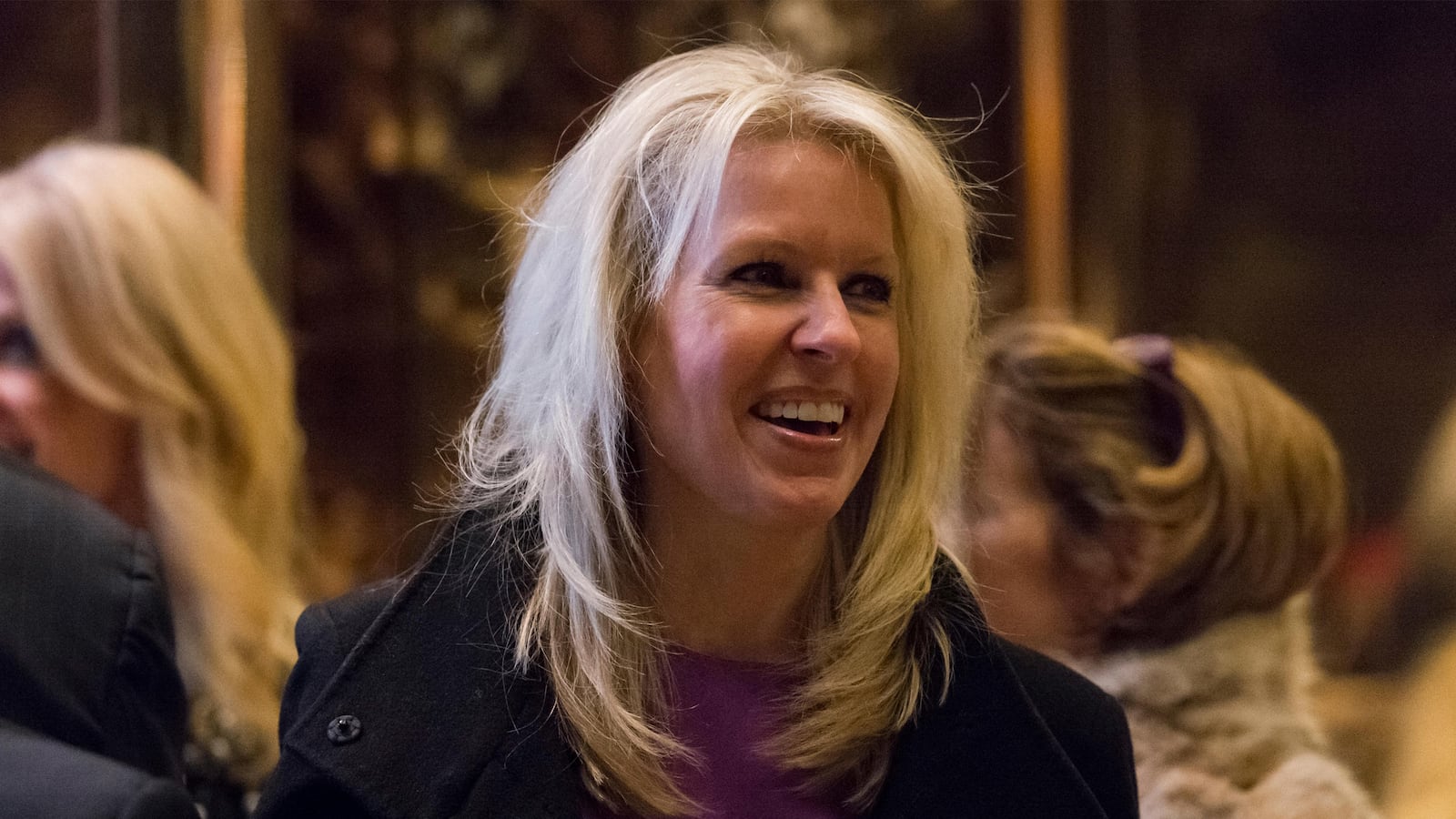A would-be Trump White House appointee who withdrew in the face of plagiarism allegations is now lobbying on behalf of a Ukrainian oligarch who has recently advocated greater concessions to the Russian government, according to newly filed documents.
Monica Crowley told the Justice Department's National Security Division that she will represent billionaire Victor Pinchuk in discussions with U.S. government officials “and other policy makers” regarding “issues of concern to Mr. Pinchuk.”
Crowley, a Fox News contributor, was in line for a senior post at the White House National Security Council until reports from CNN and Politico reported that she had plagiarized large portions of her 2012 book What the (Bleep) Just Happened and her Columbia University Ph.D. dissertation.
Crowley dismissed the plagiarism allegations in her first public remarks on the controversy last week. “What happened to me was a despicable straight-up political hit job,” she said during an appearance on the Fox News show Hannity. “It’s been debunked, my editor has completely supported me and backed me up.” (It has not been debunked.)
She nevertheless withdrew from consideration for the post shortly after the allegations surfaced. Crowley will now be “providing outreach services on behalf of Mr. Victor Pinchuk,” according to a Friday filing with DOJ’s foreign agent registration office.
The man who would have been Crowley’s boss at the NSC, former National Security Advisor Mike Flynn, also recently registered as a foreign agent, months after he went to work on behalf of a Turkish company linked to that country’s government.
Flynn resigned from his post atop the NSC last month after it was revealed that he had failed to disclose conversations during the 2016 presidential campaign with Russia’s ambassador regarding U.S. sanctions on Russia over the country’s annexation of the Ukrainian region of Crimea.
Crowley’s new gig comes as European critics of Russian aggression in Ukraine worry that Pinchuk is going soft. In a December column for the Wall Street Journal, he called on Ukrainian leaders to make additional concessions to Moscow.
“The new administration in Washington can be an opportunity for Ukraine to contribute to the solution of Russia’s intervention,” he wrote. He advised that Ukraine abandon plans to join the European Union and the North Atlantic Treaty Organization.
The column immediately drew fire from Ukrainian leaders, including president Petro Poroshenko, who reportedly indicated he would not attend Pinchuk’s annual Yalta European Strategy meeting this year due to the WSJ column.
Trump has been highly critical of NATO, even suggesting that the United States might not honor mutual defense obligations in the event of Russian aggression against the alliance’s Eastern European member states if those states do not step up their domestic defense budgets.
Crowley will now be working to facilitate relations between Pinchuk and U.S. government officials. She did not respond to questions about her new role.
Crowley’s foreign agent lobbying will supplement work by another Fox contributor, Democratic pollster Doug Schoen, who has represented Pinchuk since 2011. She will draw a salary for part-time work, according to her Foreign Agent Registration Act statement.
Schoen told the Washington Examiner that he only approached Crowley after her NSC job fell through.
“There were no discussions about any potential work she might do for my firm until she had chosen to leave her position in the administration,” he said in a statement.
According to Schoen’s registration form, he is paid $40,000 per month for work that includes “facilitating conversations between [Pinchuk] and American policymakers regarding Democratization in Ukraine and European integration.”
Since last year, Schoen has arranged meetings with officials at the NSC, the State Department, dozens of House and Senate members, and journalists and media personalities including, one recent disclosure form shows, Crowley herself.
Pinchuk made his estimated $1.5 billion fortune in Ukraine’s steel and pipeline industries. His EastOne Group currently has holdings in the industrial, media, and banking sectors.
Pinchuk was a high-dollar donor to the Clinton Foundation, and his relationship with the failed 2016 Democratic presidential nominee came under scrutiny after emails obtained through the Freedom of Information Act showed that Pinhuck had attended a dinner at her home, despite the campaign’s public insistence to the contrary.
Trump labeled Pinchuk’s financial support for the Clinton Foundation “crooked.” But Pinchuk also had financial ties to Trump himself, and they raised red flags among charity watchers concerned that Trump was drawing funds from his tax-exempt foundation.
Additional Pinchuk connections to the Trump campaign came by way of Carter Page, a Russian-friendly foreign policy advisor to the campaign. Page reportedly told Merrill Lynch colleagues in 2004, shortly before he set up the firm’s Moscow office, that he was on friendly terms with Pinchuk.
In 2015, the Pinchuk Foundation paid the Trump Foundation $150,000 in exchange for a video appearance by Trump at Pinchuk’s annual Yalta European Strategy meeting. A former official in the IRS’s Exempt Organizations unit told The Daily Beast at the time that the payment raised questions about whether Trump was evading taxes by routing income through his foundation.





